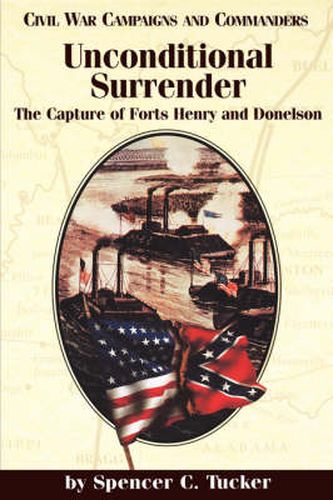Readings Newsletter
Become a Readings Member to make your shopping experience even easier.
Sign in or sign up for free!
You’re not far away from qualifying for FREE standard shipping within Australia
You’ve qualified for FREE standard shipping within Australia
The cart is loading…






This title is printed to order. This book may have been self-published. If so, we cannot guarantee the quality of the content. In the main most books will have gone through the editing process however some may not. We therefore suggest that you be aware of this before ordering this book. If in doubt check either the author or publisher’s details as we are unable to accept any returns unless they are faulty. Please contact us if you have any questions.
Civil War scholars and buffs alike have long differed on the turning point of the war. Gettysburg, Vicksburg, and Chattanooga, to name but a few, have garnered attention as turning points. Seldom do the names of Forts Henry and Donelson enter the argument. But as prolific military historian Spencer C. Tucker points out, the capture of these river bastions in Tennessee became the first important Federal victories of a war still in its infancy. From the beginning Union leaders devised a plan to capitalize on their command of America’s waterways as a means of dividing and conquering the Confederacy. Large, navigable rivers such as the Mississippi, the Tennessee, and the Cumberland formed gateways to the Southern heartland.
In February 1862 a combined effort by the land forces of unheralded Federal General Ulysses S. Grant and a flotilla of gunboats commanded by veteran Flag Officer Andrew Foote moved on the inadequate Confederate defenses of northwestern Tennessee in a attempt to open the South to deeper penetration.
Ill-prepared Fort Henry on the Tennessee fell on February 6; ten days later Grant offered the hapless commander of Fort Donelson on the Cumberland the terms for which he would become famous - Unconditional Surrender.
The loss of these two important forts opened Tennessee to Union invasion. Within weeks Nashville fell, and soon the state and most of its resources were in Union hands. Grant became an instant hero in the North, while in the South the Confederacy scrambled to recover. It never would.
Tucker, an authority on naval warfare, deftly blends the elements of naval innovation, combined operations, and political considerations into a compelling story about the beginning of the end for the Southern Confederacy.
$9.00 standard shipping within Australia
FREE standard shipping within Australia for orders over $100.00
Express & International shipping calculated at checkout
This title is printed to order. This book may have been self-published. If so, we cannot guarantee the quality of the content. In the main most books will have gone through the editing process however some may not. We therefore suggest that you be aware of this before ordering this book. If in doubt check either the author or publisher’s details as we are unable to accept any returns unless they are faulty. Please contact us if you have any questions.
Civil War scholars and buffs alike have long differed on the turning point of the war. Gettysburg, Vicksburg, and Chattanooga, to name but a few, have garnered attention as turning points. Seldom do the names of Forts Henry and Donelson enter the argument. But as prolific military historian Spencer C. Tucker points out, the capture of these river bastions in Tennessee became the first important Federal victories of a war still in its infancy. From the beginning Union leaders devised a plan to capitalize on their command of America’s waterways as a means of dividing and conquering the Confederacy. Large, navigable rivers such as the Mississippi, the Tennessee, and the Cumberland formed gateways to the Southern heartland.
In February 1862 a combined effort by the land forces of unheralded Federal General Ulysses S. Grant and a flotilla of gunboats commanded by veteran Flag Officer Andrew Foote moved on the inadequate Confederate defenses of northwestern Tennessee in a attempt to open the South to deeper penetration.
Ill-prepared Fort Henry on the Tennessee fell on February 6; ten days later Grant offered the hapless commander of Fort Donelson on the Cumberland the terms for which he would become famous - Unconditional Surrender.
The loss of these two important forts opened Tennessee to Union invasion. Within weeks Nashville fell, and soon the state and most of its resources were in Union hands. Grant became an instant hero in the North, while in the South the Confederacy scrambled to recover. It never would.
Tucker, an authority on naval warfare, deftly blends the elements of naval innovation, combined operations, and political considerations into a compelling story about the beginning of the end for the Southern Confederacy.